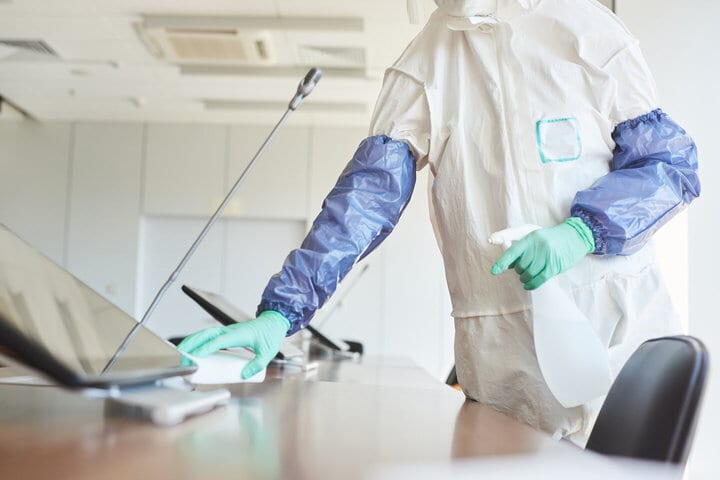After a prolonged work-from-home period spurred on by COVID uncertainty, employees are cautiously beginning to make their way back into the office – employers are now gauging how often they should be disinfecting their office. And as more and more employees return in-person behind the desk, businesses are working overtime to ensure the office environment employees are returning to is safe, clean, and sanitized. While the thought behind the action is noble — putting employee health front and center — the cleaning and sanitization methods being employed by many businesses to combat the presence of bacteria and germs in the workplace could use a second opinion.
In a troubling development to many experts, business-owners may be cleaning their offices too frequently. The notion may seem preposterous to some, particularly considering the year-long battle with the novel coronavirus, but the old adage does seem to hold true in this case: there can be too much of a good thing.
How Often is Too Often for Disinfecting my Office?
Near the beginning of the coronavirus outbreak, it was common for businesses and offices to do a thorough deep-clean every few hours as a precaution, some as often as 6–8 times a day, according to Bloomberg. Time and further research into the spread of the virus and the virus composition has led to cleaning cycles that are less frequent, and more subjective.
According to the Centers for Disease Control (CDC), high-use spots, such as door handles, light switches, desks, phones, and faucets, should all be cleaned and disinfected more frequently, but the approximate amount is up to individual businesses. In general, for most offices, all high-use spots should be cleaned at least daily. For unoccupied spaces that see more low usage, the CDC recommends they be cleaned at least once a week. This is because the COVID-19 virus does not have an extended lifespan on surfaces, lasting anywhere from a few hours to a day, with warm weather and exposure to sunlight shorting that lifespan even further.
Why is Cleaning Frequently a Bad Thing?
As mentioned, frequent cleaning is being performed to help safeguard employees, customers, and the public from the spread of germs and bacteria — so what makes disinfecting an office so often bad?
The reason frequent cleaning is frowned upon has as much to do with the products being utilized as it does with the spread of the diseases and germs being targeted. While there are several products on the market that claim to be effective disinfectants, many of the products currently being used in offices have not been fully cleared as being safe in relation to human health. This is primarily due to a lack of thorough research on the chemicals being employed, though there have been a number of limited studies that have shown some of the chemicals used can have particularly dangerous side effects on animal test subjects.
Increasing the frequency with which these chemical disinfectants are spread on the most common surfaces within an office could lead to major health concerns for the same employees business-owners are trying to protect. Yet, the surfaces do need to be cleaned to help reduce the potential spread of additional bacteria and pathogens. So what choice do businesses have to turn to when considering how best to keep their employees safe when returning to work?
A Non-Toxic, More Effective Cleaning Agent for Disinfecting Your Office
One alternative is a cleaning agent that lasts longer, and works differently, to provide a more effective level of disinfection — MicrobeCare™. Other cleaning agents are generally aerosolized using electrostatic sprayers, to speed up the distribution of the agents, but causing potential respiratory issues in addition to the side effects of the cleaning agents themselves. MicrobeCare™ uses a unique application process that works by bonding directly to the surface the treatment is applied to through a mechanical mode of action, allowing the treatment’s molecules to link with the adjacent molecules, coating the surface and forming a barrier on the treated surface. Once this barrier is formed, MicrobeCare™ draws in microbes with positively-charged nitrogen, and ruptures the pathogens with a long carbon chain.
Because of the specific type of bonding MicrobeCare™ is able to achieve with the treated surface, the treatment is able to remain effective for longer periods of time, leading to less frequent applications — once every six months, rather than every few hours or days for other antimicrobial solutions.
This provides greater peace of mind to businesses and employees as they are able to go about their work without being exposed to potentially harmful disinfects on a frequent, disruptive schedule. Instead, employees are able to interact with surfaces they know have been treated, and are able maintain their efficacy, without feeling exposed to chemical antimicrobial disinfectants, as MicrobeCare™ is non-leaching, and will not transfer from surfaces to clothes, food, or skin.
Reduce the frequency and increase the effectiveness of office disinfection without risking greater exposure or gambling with employee health. Reach out to Clean Technologies today to see how their MicrobeCare™ could help protect your workplace from germs, mold, mildew, and bacteria. Visit our website, or contact Clean Technologies today!


Recent Comments